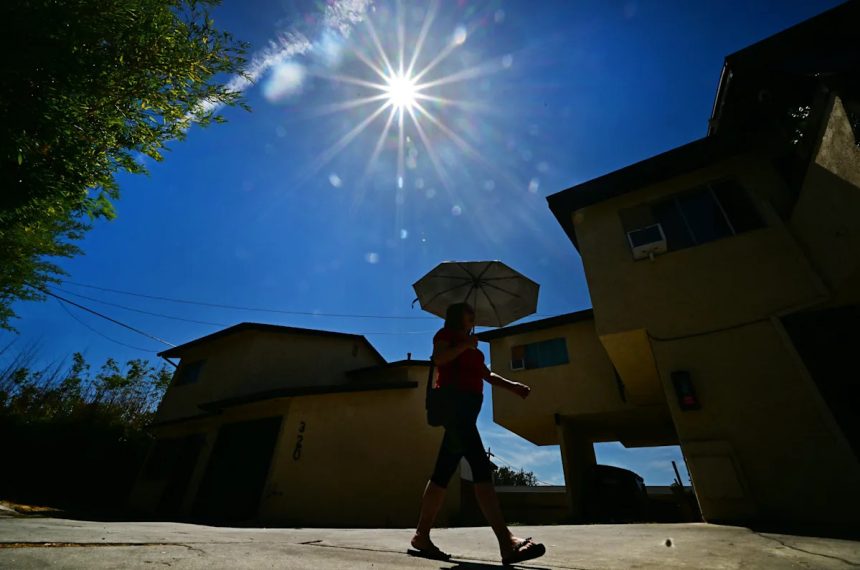Amid ongoing wildfires, extreme heat is gripping the Pacific Northwest, with temperatures climbing into the low-90s across Washington through the next couple of days.
The National Weather Service has issued an excessive heat warning for much of the state’s most populated corridor, from the Washington-Oregon border north to Bellingham, including Seattle and Tacoma.
One of the biggest concerns, experts say, is that nighttime temperatures aren’t cooling. Warm nights can be just as dangerous as triple-digit daytime heat, because the body has little chance to recover from daytime exposure, according to the Weather Channel.
This increases the risk of heat-related illness for older adults, children, outdoor workers, and people with health conditions. Consecutive warm nights also strain hospitals and emergency responders, as heat stress builds up over multiple days without relief.
Pacific Northwest heat wave: How high will temperatures get in Washington? See forecast.
A dangerous heat wave peaking Monday, Aug. 25, will drive afternoon highs into the low-to-upper 90s across much of the Pacific Northwest.
Seattle is expected to peak around 85 degrees, while Chehalis and Olympia could reach the lower 90s. Quilcene may hit 92 degrees, and Diablo is forecast to reach 95. Some locations could challenge daily temperature records.
The National Weather Service warned that the heat will linger after dark, with overnight lows staying well above normal and “numerous” nighttime records likely to fall.
Heat advisories and excessive heat warnings remain in effect through Tuesday, Aug. 26. The Portland weather office urged residents to “stay cool, hydrate & check on others.”
When will temperatures cool down in Washington?
Much of Oregon will stay under a significant heat advisory — the highest level, 5 of 5 — through early Wednesday, Aug. 27, before conditions ease slightly, with highs dipping into the mid-70s to low-80s,
The Climate Prediction Center’s outlook shows well-above-normal temperatures across Washington through September, with above-normal warmth likely lingering into October and November.
For the foreseeable future, highs are expected to stay in the mid-80s, with overnight lows no cooler than the lower 60s. These temperatures are well above normal for Washington nights and pose a significant danger for those without air conditioning.
The National Weather Service shows temperature highs for Monday, Aug. 25, 2025.
Should I open my windows at night to cool off?
Depending on humidity, leaving windows open can let in hot, moist air. This not only feels uncomfortable but can also be absorbed by carpets and furniture, increasing the risk of mildew.
With overnight temperatures dropping only about 10 degrees from daytime highs, opening windows may not provide relief — and could even release cooler air already trapped inside.
National heat index map: How hot does your city feel?
The map below identifies areas where the heat index is forecasted to reach NWS-defined levels from “Caution” (80 degrees Fahrenheit) to “Extreme Danger” (above 125 degrees).
The heat index measures how hot it actually feels when factoring for humidity. Prolonged exposure to a heat index above 80 degrees can lead to fatigue, as previously reported by USA TODAY. As it gets hotter, the risk continues to increase − potentially resulting in heat stroke or even death. Older adults, children, and outdoor workers are generally at higher risk of heat-related incidents.
Search the heat index forecast in your area
Is your city getting hotter? It’s possible! You can check the heat index forecast here to find out!
What is an extreme heat warning?
The National Weather Service issues different alerts depending on how severe and certain the heat threat is, and the thresholds vary by region.
-
Extreme Heat Warning — Take Action!Issued when extremely dangerous heat conditions are expected or happening. Avoid outdoor activities during the hottest part of the day, stay in air-conditioning as much as possible — even overnight — and check on family, friends, and neighbors.
-
Extreme Heat Watch — Be Prepared!Issued when forecasters see the potential for extreme heat but details on timing and severity remain uncertain. Plan ahead for the possibility of suspending outdoor activities and make arrangements for a cool place to stay if you don’t have air conditioning.
-
Heat Advisory — Take Action!Issued when dangerous heat is expected but conditions don’t meet warning criteria. Limit time outside, stay hydrated, and take frequent breaks in the shade or in cool spaces.
What’s the difference between temperature and heat index?
The temperature is the actual air reading — what a thermometer records in the shade. The heat index, on the other hand, represents what it feels like to the human body when both temperature and humidity are factored in, according to the National Weather Service.
When humidity is high, sweat doesn’t evaporate as easily, making it harder for your body to cool down. That’s why the heat index is often higher than the air temperature, and why it’s used to gauge the risk of heat-related illness.
Washington weather watches and warnings
What are the symptoms of heat-related illness?
Extreme heat is the deadliest weather-related hazard in the United States, claiming more lives each year than hurricanes, floods or tornadoes.
Experts urge those under a heat wave to take precautions: stay hydrated, avoid outdoor activity during peak afternoon hours, wear light clothing and check on vulnerable neighbors, including older people and those without air conditioning, throughout these next couple of weeks and into the summer.
According to the Centers for Disease Control, multiple types of heat-related illnesses exist. Heat cramps and heat rash can be treated by staying indoors and getting hydrated. But some others are more serious.
Heat exhaustion symptoms
Heat exhaustion is a mild heat-related illness that occurs in hot temperatures, especially when you’re not drinking enough water or other nonalcoholic fluids. People most at risk for heat exhaustion are the elderly, those with high blood pressure, and individuals working or exercising in the heat.
Symptoms of heat exhaustion include:
If you or anyone you’re with experiences these symptoms, move to a shaded or air-conditioned area, use a fan, or immerse in cool water. Also, drink cool, nonalcoholic beverages with electrolytes like water or sports drinks.
Heat stroke symptoms
Heat exhaustion can escalate into heat stroke, a serious, life-threatening condition. Heat stroke occurs when the body’s temperature rises rapidly, and it can no longer cool itself down.
Early symptoms of heat stroke are similar to heat exhaustion but progress to more severe signs, including:
-
Body temperature rising to 106°F or higher within 10-15 minutes (even without a thermometer, the skin will feel very hot)
Heat stroke is a medical emergency. If you suspect someone is experiencing it, seek immediate medical attention. Without emergency treatment, heat stroke can cause death or permanent disability.
Stay informed. Get weather alerts via text
Brandi D. Addison covers weather across the United States as the Weather Connect Reporter for the USA TODAY Network. She can be reached at baddison@gannett.com.
This article originally appeared on Kitsap Sun: Extreme heat wave over Washington. See if your city is in ‘danger’ zone









